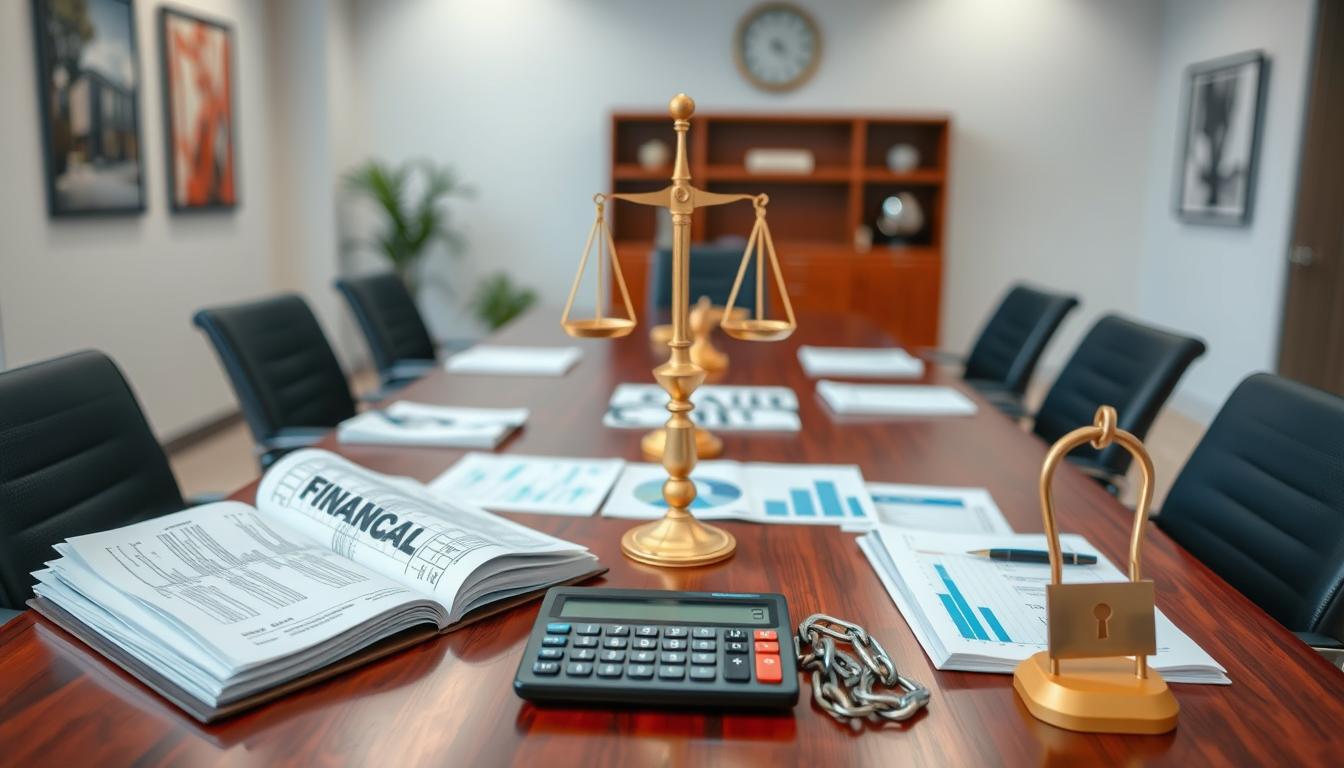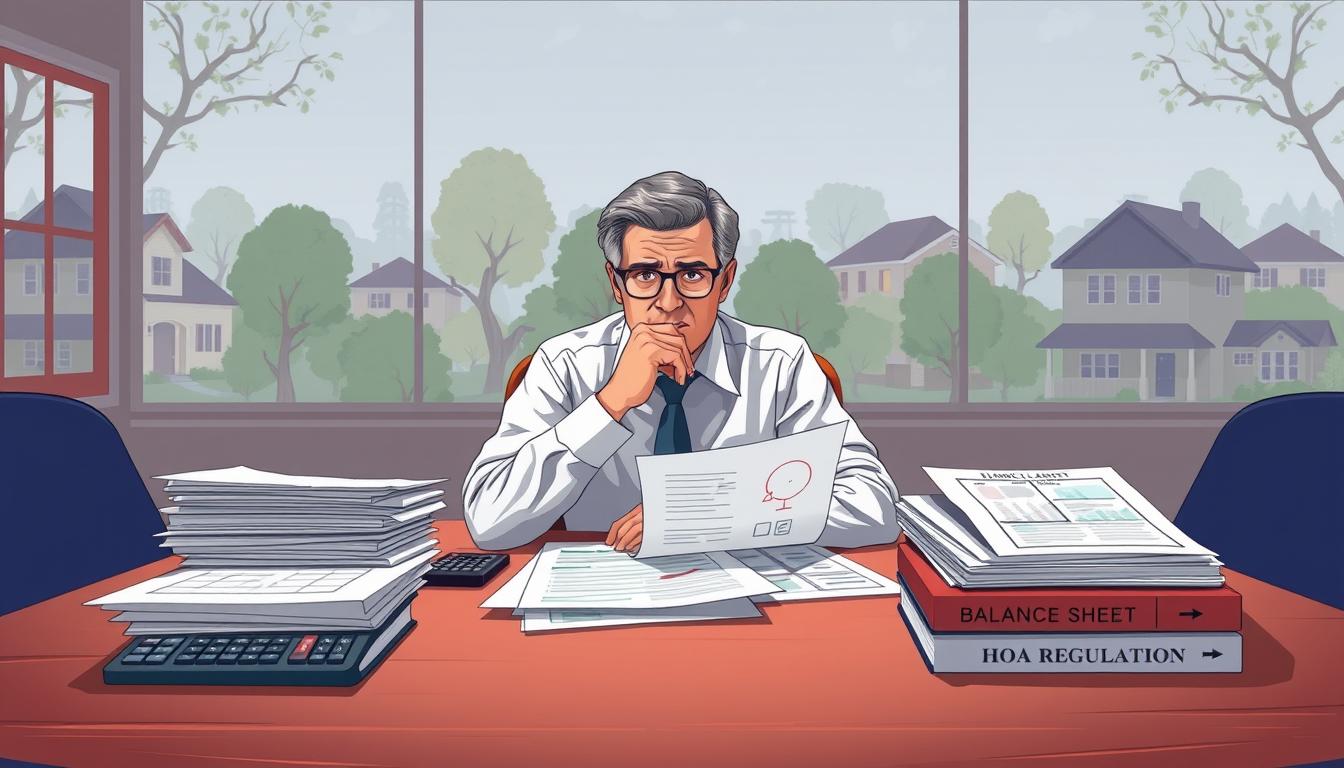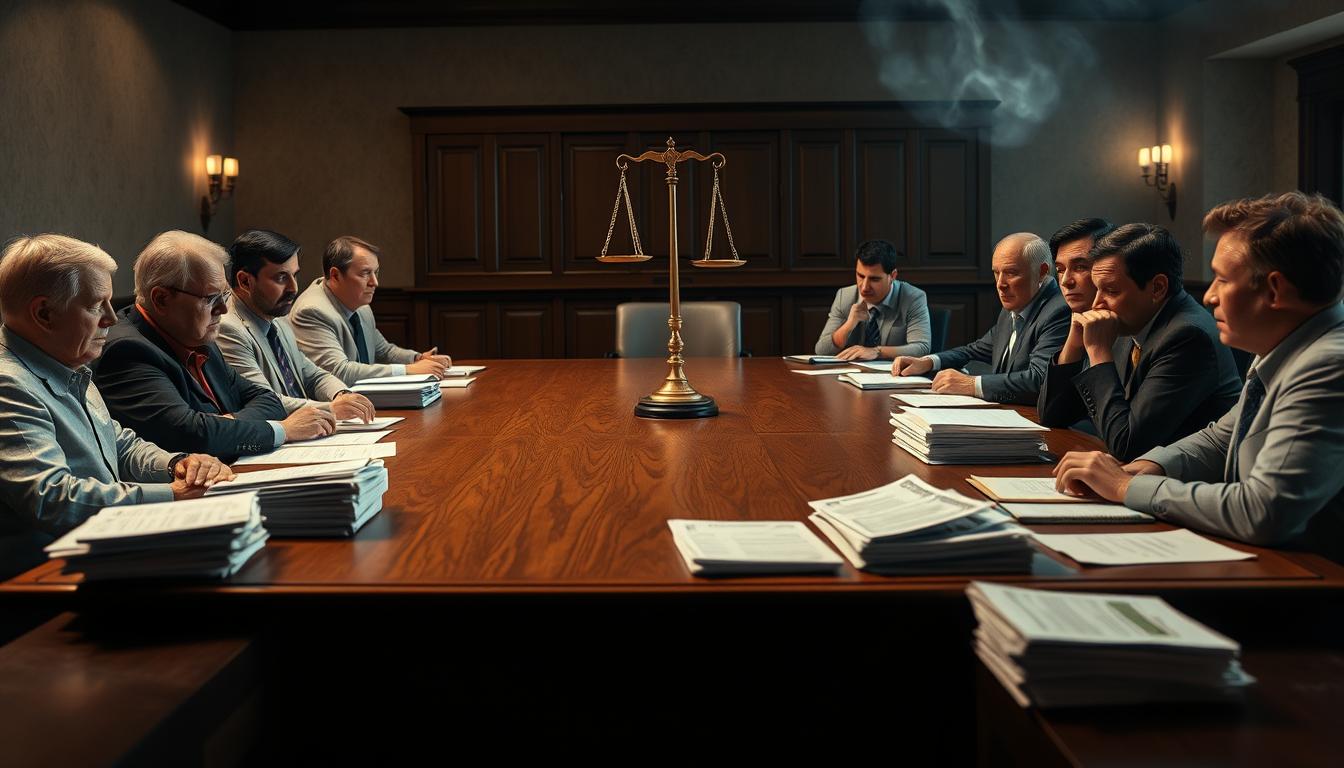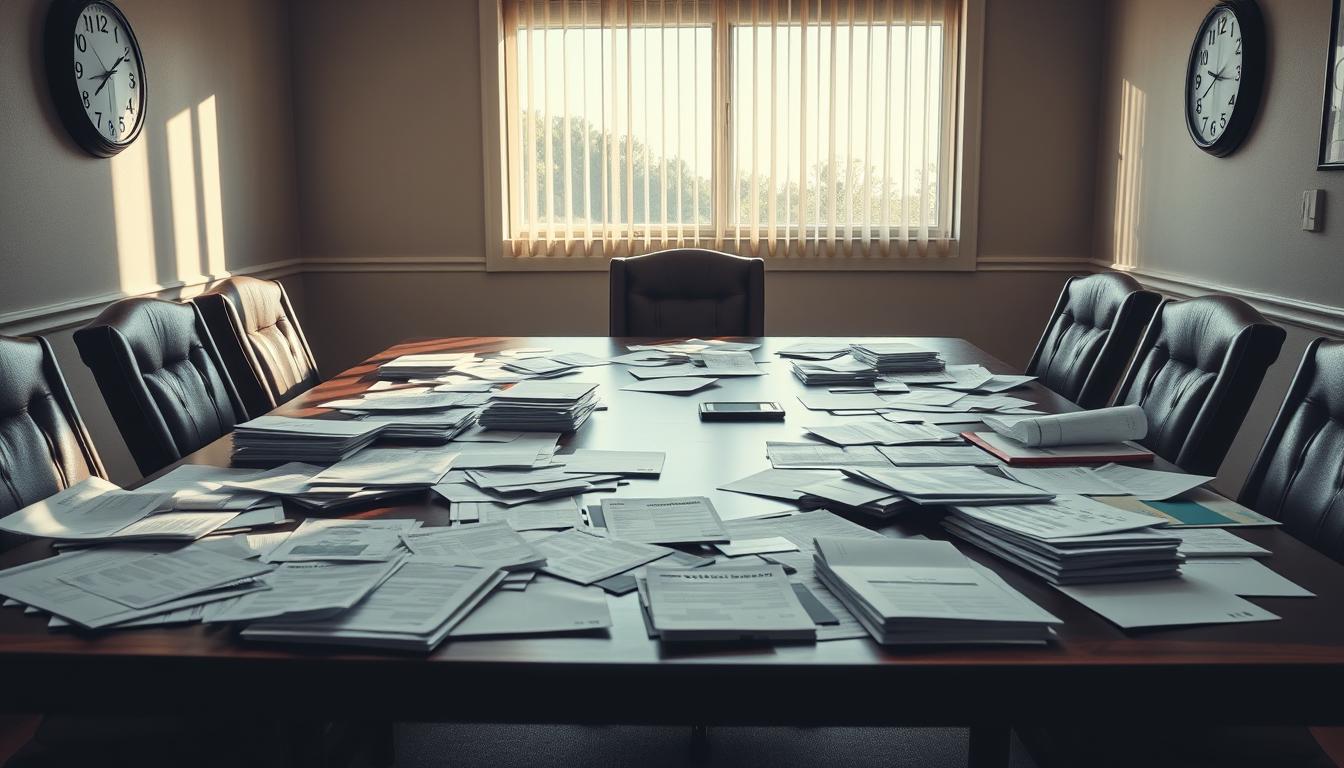Can an HOA Board Member Owe the HOA Money?
Did you know 70% of homes in the U.S. are in HOA communities? HOA board members manage money for these communities. But, what if a board member owes money to the HOA? This brings up big questions about debt and financial duty.
It’s key to know the money rules for HOA board members. This includes if they can owe money to the HOA.
Key Takeaways
- Knowing the money rules for HOA board members is vital for the HOA’s health.
- Board members must handle money wisely, avoiding debt.
- Can a board member owe money to the HOA? It’s a big issue with legal and moral sides.
- Board members must pay their share on time, including extra fees.
- Not paying can lead to legal trouble for the board member and harm the community.
- Clear rules for paying are needed to avoid debt and keep the HOA stable.
Understanding HOA Board Member Financial Obligations
HOA board members are key in handling community money. They do more than lead. They also handle money tasks to keep things running smoothly.
Basic Financial Responsibilities
They watch over budgets and check how money is spent. They make sure money is used right. They also keep financial records open for everyone to see.
Types of HOA Fees and Assessments
Members pay HOA dues for upkeep and services. Sometimes, special assessments are needed for big costs or projects. Knowing about these fees helps manage hoa dues delinquency.
Standard Payment Requirements
It’s important to pay on time. Board members must follow payment rules and handle late payments. This keeps the community’s money in good shape.
| Financial Obligation | Description |
|---|---|
| Budget Management | Creating and overseeing the annual budget to ensure funds are allocated properly. |
| Expenditure Oversight | Monitoring spending to prevent overspending and ensure financial stability. |
| Fee Collection | Ensuring timely collection of HOA dues and assessments from members. |
| Financial Reporting | Maintaining transparent financial records and providing regular reports to members. |
Legal Framework Governing HOA Board Member Payments
The laws for HOAs are clear about hoa board member liability and hoa board member financial liability. These rules help board members handle money well and meet their financial duties.
State laws and federal rules tell HOA boards what to do. They must be open about money matters and report often to members. This keeps the HOA and its people safe by making sure everyone is responsible.
If board members don’t handle money right, they could face big problems. Laws might make them pay back money they owe. Knowing these rules helps board members do their jobs well.
| Legal Aspect | Description |
|---|---|
| Fiduciary Duty | Board members must act in the best interest of the HOA, managing funds prudently. |
| Financial Reporting | Regular financial statements must be provided to ensure transparency. |
| Liability for Debts | Board members can be held personally responsible for unpaid HOA fees. |
| Regulatory Compliance | Adherence to state and federal laws governing HOA operations. |
Common Scenarios Where Board Members May Owe Money
Board members are key in managing HOA money. They might face situations where they owe money. Knowing these situations helps avoid late payments and debts.
Unpaid Regular Assessments
Regular assessments keep community amenities in good shape. If board members don’t pay, it hurts the HOA’s budget. It also stops planned projects.
Special Assessment Debts
HOAs sometimes need special assessments for sudden costs. If board members don’t pay on time, it hurts the HOA’s money health.
Violation Fines and Penalties
HOAs fine for rule breaking to keep order. If board members don’t pay these fines, they build up debt. This can lead to legal trouble.
Misuse of HOA Funds
Board members mishandling HOA money can cause big debts. This not only hurts the board member but also damages community trust.
| Scenario | Description | Consequences |
|---|---|---|
| Unpaid Regular Assessments | Failure to pay monthly or annual dues. | Strained HOA budget, halted projects. |
| Special Assessment Debts | Missing payments for unexpected expenses. | Financial instability, possible legal action. |
| Violation Fines and Penalties | Accumulating unpaid fines for rule breaches. | Increased debts, legal consequences. |
| Misuse of HOA Funds | Improper handling of association finances. | Loss of trust, potential lawsuits. |
The Impact of Board Member Debt on HOA Operations
When an HOA board member has unpaid balances, it puts a big strain on the community. It takes money away from fixing things and making the place look nice. This makes the community less safe and less appealing.
Reserve funds are key for planning ahead and for unexpected costs. If a board member owes money, it can use up these funds. This leaves the HOA without money for future needs.
Living in the community can also get worse. Not having enough money might mean less landscaping or security. This can make life harder for the people living there.
Debt can also make it hard for the board to make decisions. They might not be able to act fast or make good choices. This can slow down the community’s growth and progress.
It can also hurt the board’s reputation. If people see that there are unpaid balances, they might not trust the board. They might wonder if the board can handle the community’s money well.
Having a clear HOA collection policy is very important. It helps keep the community running smoothly. It makes sure the board can take care of the community’s finances well.
Can an HOA Board Member Owe the HOA Money: Legal Implications
It’s important to know the law when asking can an HOA board member owe the HOA money. Laws change from state to state.
State-Specific Regulations
Laws in the U.S. vary, affecting how debts are handled. Some states have clear rules for collecting money from board members.
Fiduciary Responsibilities
Board members must act for the HOA’s good. Not paying debts can break these rules, leading to legal trouble.
Personal Liability Considerations
In some cases, board members might have to pay personally if they owe the HOA. This could risk their personal belongings if the debt isn’t paid.
| Aspect | Details |
|---|---|
| State Regulations | Varies by state; some have strict recovery processes. |
| Fiduciary Duties | Board members must act in the HOA’s best interest. |
| Personal Liability | Potential risk to personal assets if debts are unpaid. |
Collection Procedures for Board Member Debt
Keeping finances in order is key for any HOA. If a board member has money troubles, knowing the hoa collection policy is vital. It helps keep things running smoothly.
Standard Collection Process
HOAs start by following a set plan to collect debts:
- They send out first reminder notices to the board member.
- Then, they follow up if the debt is still not paid.
- They keep records of all their collection efforts.
Legal Enforcement Options
If usual methods don’t work, HOAs might go to court:
- They might hire a collections agency for help.
- They could put a lien on the board member’s property.
- They might get legal advice on taking further action.
Payment Plan Possibilities
HOAs can offer payment plans to help board members:
- They can set up monthly payments that fit the member’s budget.
- They might lower interest rates to make payments easier.
- They make sure the terms and deadlines are clear.
| Procedure | Description |
|---|---|
| Reminder Notices | First messages to tell board members about unpaid debts. |
| Follow-Up Communications | Second messages for debts that are still unpaid after the first notice. |
| Collections Agency | Professional help to get debts back for the HOA. |
| Property Liens | Legal claims on a member’s property to get the owed money. |
| Payment Plans | Flexible ways to pay off debts to help board members. |
Ethical Considerations and Board Service
Being ethical is key for HOA board members. HOA board member financial responsibility builds trust and openness in the community.
- Transparency in financial dealings
- Avoiding conflicts of interest
- Upholding fiduciary duties
“Ethical leadership fosters a trustworthy and effective HOA, ensuring all members feel confident in their board’s decisions.”
When board members don’t meet their HOA board member obligations, it can hurt their leadership. Not paying bills on time can cause problems. It might lead to personal interests getting in the way of making fair decisions. This could harm the community’s money health.
| Ethical Guideline | Description |
|---|---|
| Transparency | Openly sharing financial information and decisions with HOA members. |
| Conflict of Interest | Avoiding situations where personal interests could interfere with board duties. |
| Fiduciary Duty | Acting in the best interest of the HOA, managing funds responsibly. |
| Accountability | Taking responsibility for financial decisions and their outcomes. |
Preventing Board Member Payment Issues
It’s key to make sure HOA board members handle money well. This keeps the community safe. We can stop problems by being ready.
Financial Screening Procedures
Before they join, new board members must go through a money check. This checks if they can pay their way and know their duties. It helps pick members who are serious about money matters.
Clear Payment Policies
It’s important to have clear rules for paying. These rules should say what’s expected and what happens if payments are late. This way, everyone knows their part and avoids money problems.
Regular Financial Reviews
Checking the money regularly makes things clear and fair. Audits and reports help the board keep track of payments. It shows everyone how important money matters are.
Best Practices for Managing Board Member Financial Obligations
Managing hoa board member payment obligations well is key. It keeps trust and operations smooth. Clear talk is the start of being financially responsible.
Using policies the same way helps everyone know their financial liabilities. Regular training keeps these rules fresh in everyone’s mind.
- Set clear financial rules and policies.
- Do regular financial checks and audits.
- Fix payment problems fast and fairly.
- Make a place where everyone is accountable and open.
Dealing with money issues quickly stops big problems. By being clear and strict about money, HOAs stay strong and earn community trust.
| Best Practice | Description |
|---|---|
| Transparent Communication | Make sure all financial rules and duties are clear to board members. |
| Consistent Policy Application | Follow financial rules the same for everyone to avoid unfairness. |
| Prompt Issue Resolution | Fix money problems right away to keep trust. |
| Regular Financial Reviews | Do regular checks to keep an eye on money health and rules. |
Conclusion: Maintaining Financial Integrity in HOA Leadership
Keeping finances right is key for good HOA leadership. A board member’s money matters a lot for the community’s health. Knowing if a board member can owe money to the HOA is important.
Yes, a board member can owe money to the HOA. But solving this problem needs careful legal and ethical steps. Clear rules help avoid confusion and keep trust high.
Board members should know their money duties well. This protects their own money and the HOA’s. A culture of being accountable and responsible keeps things running smoothly.
Being proactive with money matters helps the whole community. It keeps the HOA successful for a long time.
FAQ
Can an HOA board member owe the HOA money?
Yes, a board member can owe money to the HOA. This happens if they don’t pay dues or assessments. It might be because of personal money problems or mistakes.
What are the financial responsibilities of an HOA board member?
Board members must pay dues, special assessments, and fines. They also help with the HOA’s budget and planning. This keeps the HOA’s money safe.
What happens if a board member has HOA dues delinquency?
If dues are late, the HOA starts its collection process. This might include reminders, late fees, or even legal action to get the money back.
How does the HOA collection policy apply to board members?
The collection policy is the same for everyone, including board members. It shows how the HOA will collect debts fairly and consistently.
What is the legal liability of an HOA board member who owes money?
If a board member owes money, they could face lawsuits or liens on their property. They might also be personally responsible for the debt, based on the HOA’s rules and state laws.
How does HOA board member debt impact the community?
Debt can hurt the HOA’s finances. This might mean less maintenance, delayed projects, and higher dues for others. It can also hurt trust and morale in the community.
What are the payment obligations for HOA board members?
Board members must pay dues, special assessments, and fines. They need to follow the HOA’s payment rules to stay in good standing.
Can an HOA take legal action to collect outstanding balances from a board member?
Yes, the HOA can take legal steps to get money from a board member. This could include lawsuits, judgments, or liens on their property.
What ethical considerations should HOA boards keep in mind regarding board member debt?
Boards should be open and fair about debt. They should deal with financial problems quickly and avoid conflicts of interest. This keeps the association’s reputation strong.
How can HOAs prevent board member payment issues?
HOAs can check candidates’ finances well and have clear payment rules. Regular financial checks can also help spot and fix problems early.
What are the consequences of delinquent payments by HOA board members?
Late payments can lead to fines, losing voting rights, or being removed from the board. Persistent problems might lead to legal action or harm to the member’s reputation.
Are HOA board members personally liable for debts to the HOA?
It depends on the HOA’s rules and state laws. Board members should know their financial duties and the risks of not meeting them.





